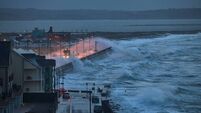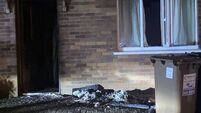Emergency medicine consultant Adrian Murphy is a doctor on a mission

I think it’s difficult, to be honest. The perception is that conditions are pretty difficult to work in and the alternative is to go to the southern hemisphere, for example, where the work-life balance appears to be better
I got superb training in this country. I finished my training by doing a fellowship at probably the pre-eminent hospital emergency service in the world — my sub-speciality is pre-hospital emergency care — and I said, ‘Well look, I’ve learned a lot by being abroad, by working in multiple acute hospitals in Ireland, and I believe I can make a change.’ I may not be able to improve the system but I can certainly improve the patient experience coming though emergency departments in the city. And what I want to do is attract young, bright, energetic, motivated doctors to work with us. We have to have a vested interest in our medical students, our trainee doctors. Certainly in our department we’re beginning to cultivate a research portfolio. We’ve developed a strong emphasis on teaching, on weekly teaching for non-consultant hospital doctors in training and we are going to continue to develop that.
I don’t think so. More often than not when trainees leave they will have spent some time as young doctors in the Irish health system. They’ve contributed to our healthcare system during that time.
I think it could be better when you invest so much in your career — it’s taken me 13 years to get to the point of being a consultant. As a junior trainee, as an intern, as a senior house officer you work anything between 70-100 hours per week. Anyone who graduates in medicine and who specialises makes a considerable sacrifice in terms of family time, spending time with your kids.
Then there’s the financial sacrifice. In order to do a PhD (in the National Children’s Research Centre in Crumlin, exploring ways to improve pre-hospital pain management in kids), I had to do three years’ full-time research. But I had to do locum shifts and other work to fund the research.
My early years of training involved moving every six or 12 months to a different city. And when you are newly married or when you have small kids it’s often not feasible, particularly if your wife is working, to bring the whole family with you. I have four small boys, the youngest being 10 months and the oldest being six, so for many years we’ve been paying a mortgage on our home and renting a second house in Dublin or Limerick.
You’ve some authorities suggesting we’ve got fat-cat consultants who are exceptionally well-paid — but if that’s the case why are there so many consultant vacancies?
I’ve no idea. I think if I didn’t do medicine and if I had a trade, or was in law or accountancy, a professional, if I was working 80-100 hours a week and was good at what I did, and without the need to travel and be on the move every 12 months, I’d probably be considerably better off. If you want to make money, I wouldn’t suggest doing medicine.
I would wholeheartedly support that. In emergency medicine violence and aggression are a regular component of our work environment. Sometimes it’s a manifestation of mental illness or medical illness but often it is as a consequence of intoxication through alcohol or drugs. And occasionally it’s a result of simple badness. But we can’t tolerate that. And we shouldn’t have to. And we shouldn’t have to find ourselves in a situation where we accept that coming into work, you’re going to be faced with this. Certainly our position has been that you don’t tolerate abuse of any staff, either verbal or physical.
About six months ago we introduced mandatory training for all staff right across the department in strategies to deal with the aggressive or violent patient. In the vast majority of cases, it revolves around communication and the vast majority of verbally abusive or aggressive patients can be dealt with in a non-confrontational way, where essentially you are talking them down.
Certainly it’s the experience of many staff that verbal abuse can be a daily occurrence. Physical abuse is a much rarer event, but when it happens it’s frightening for staff. I wouldn’t like to think of any of our staff, particularly any of our nurses, leaving home and going home to their kids and husband of an evening, having been assaulted at work. Nobody should have to work in that kind of environment. To be fair I think we are very well-supported by a robust security system in the ED.
I don’t know. On a practical level, I don’t believe that the existing ED in CUH could accommodate what we are seeing, c34,000 patients per annum. On the basis of capacity alone, CUH couldn’t accommodate that. So I can’t see it happening overnight.
Currently no, but we are expecting to advertise two new posts for the city in 2017.
If you are critically injured, it’s about slowing down the dying process. So that might mean delivering an anaesthetic to the head- injured patient, inserting a breathing tube into their airways and putting them on a ventilator. It may involve giving them particular medicines in the context of massive haemorrhage and other therapies. There are a multiplicity of critical care interventions that we can undertake in the pre-hospital setting.
CUH has a long-established history of delivering medical teams and physicians to the roadside. In fact CUH is the only hospital in the country that has been engaged in pre-hospital emergency medicine for over 20 years.
What’s interesting is that when you look back in history, Cork has been involved in a number of major incidents over a very short space of time during the late ’70s and early ’80s — between the Buttevant train crash, the Glounthane bus crash, the Whiddy disaster, Air India, and more recently the Manx2 aircrash.
When you start considering how those big catastrophic events in the late ’70s and early ’80s essentially required the Cork Regional Hospital at the time to produce an extraordinary response, with many medical teams deployed from the hospital to save lives, you see why the service has developed to where it is, refined over the years.
No, I don’t think it’s enough. I think that having at least a second dedicated, physician-led air ambulance service in the south of the country makes practical sense.
People often forget if you’re travelling from Castletownbere to Dublin, the halfway point is Mitchelstown and you are still in Cork. So I think the practical solution to the logistical challenges is to have an aircraft in support.













